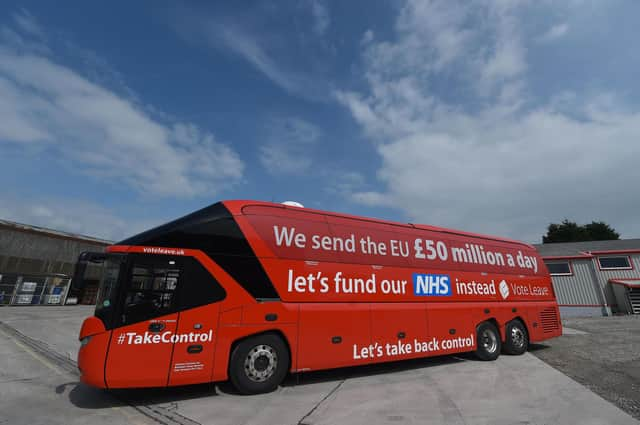Scottish independence or Brexit, the lies of 2014 and 2016 should make us wary of referendums with no way back – Brian Wilson


The number is unlikely to increase over coming months as energy prices soar, shelves stay half-empty and there aren’t enough lorry drivers to deliver the Christmas presents.
While the extent to which Brexit is responsible for these misfortunes is open to debate, public opinion tends to like short-hand explanations. So Brexit will get at least its fair share of blame.
Advertisement
Hide AdAdvertisement
Hide AdThis does not translate fully into how people would vote if there was a re-run. The Statista site which tracks that question found in mid-September that 47 per cent would vote to stay in the EU, 40 per cent for Brexit with 13 per cent undecided.
It is a hypothetical exercise since that is not how referendums work. To the victors the spoils and a majority of one, no matter how achieved, means the die is cast for ever and a day. At least, that’s what we are encouraged to assume.
I wonder if it will look quite like that in three or four years time? By then, the Brexit report card will be much fuller. The difficulties may have proven to be short-term. Some of the claimed benefits may have emerged. The shelves may be full, with HGV drivers aplenty.
But if none of that happens, the next General Election will not be fought with Brexit as a given. The public mood will demand an alternative and Labour would be crazy not to offer it; probably not a full re-joining but certainly substantial renegotiation – a position they are already edging towards.
There are lessons for Scotland in all of this and they are not necessarily the ones nationalists want to hear. Beating an anti-Brexit drum serves them well for the present and, on the surface, it seems logical that the more people turn against it, the more the separatist alternative will prosper. It’s not that simple, however.
The reality is that “independence inside the EU” is not within their gift to offer; nor is it likely to be, in three years’ time or in 30. Under any scrutiny, the falseness of that enticement becomes transparent. Running as a party that wants to break up the UK in order to join the EU becomes just another con trick.
The promise to resolve one constitutional mess by creating an even bigger one is unlikely to have lasting appeal. By comparison, the prospect of a UK government that seeks a relationship with Europe based on a very different mindset to the one that motivated Brexit might seem an attractive offer.
The bigger lesson with certain relevance to Scotland involves the folly of referendums as a means of determining anything of lasting constitutional importance, particularly where there is absolutely no prior evidence of a consistent majority demanding irrevocable change.
Advertisement
Hide AdAdvertisement
Hide AdWhen opinion is divided fairly evenly, the “winner takes all” nature of referendums makes them natural territory for the most dishonest people in politics, for whom the end will always justify the means, with no possibility of redress. If they lose, they just start all over again.
We rightly recall the lies of the pro-Brexit campaign about billions flowing to the NHS. Equally, let it never be forgotten, we saw it in the 2014 Scottish referendum with the utterly mendacious claim that the “likely average price of oil” was $112 a barrel – a figure not subsequently come anywhere close to, even now.
Just as the public mood is swinging against Brexit with no way back, so if 2014 had gone the other way, there would have been years of bitter recrimination and repenting at leisure as truths about economy, currency, borders and all the rest of it emerged; with no opportunity for collective second thoughts.
A referendum where there is no clear majority demand for one is not a test of democratic opinion so much as a spasm which favours the most unscrupulous forces. That is a truth that does not just apply to Brexit – and one from which the fate of Scotland is certainly not exempt.
A message from the Editor:
Thank you for reading this article. We're more reliant on your support than ever as the shift in consumer habits brought about by coronavirus impacts our advertisers.
If you haven't already, please consider supporting our trusted, fact-checked journalism by taking out a digital subscription.
Comments
Want to join the conversation? Please or to comment on this article.
